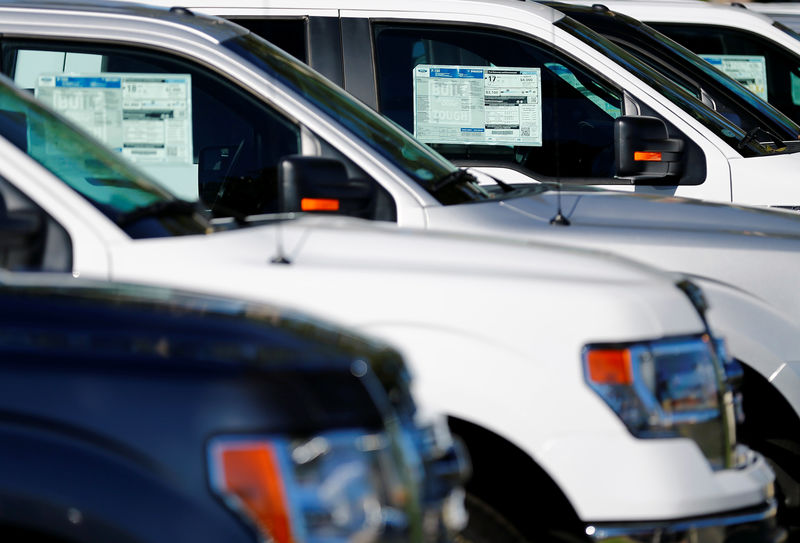By Nick Carey
DETROIT (Reuters) - Major U.S. automakers' sales figures for March came in below market expectations and gave early evidence that America's long, robust boom cycle for car sales may finally be losing steam.
General Motors Co (N:GM) and Fiat Chrysler Automobiles NV (MI:FCHA) (N:FCAU) shares both fell almost 4 percent, while Ford Motor Co (N:F) was off 3 percent.
Auto industry publication WardsAuto put the seasonally-adjusted annualized rate (SAAR) for light vehicle sales in March at 16.53 million units. Industry consultant Autodata put industry SAAR at 16.62 million units for March.
That was below the 17.3 million analysts polled by Reuters had expected, and the first time since August that the SAAR - a crucial industry metric - had fallen below 17 million.
March "was a tough, tough, tough market," said Judy Wheeler, vice president of U.S. sales at Nissan Motor Co Ltd (T:7201), which reported a 3.2 percent increase in March sales. "It's going to be an aggressive year and I think everybody realizes that."
Industry experts are increasingly concerned about rising inventory levels and consumer discounts as automakers push harder to sell their products. A pricing war in the market could undermine automakers' profits.
Last week, Moody's warned that flattening U.S. auto sales pose a significant credit risk for auto lenders.
Karl Brauer, executive publisher at auto industry consultancy Kelley Blue Book said while overall sales looked "healthy" in March discounts "have risen across the board, even on the same truck and SUV models that used to sell themselves."
Nissan's Wheeler said Nissan's internal data showed consumer discounts were $441 higher per vehicle than a year ago and inventory levels were on the rise.
Nissan trucks, SUVs and crossovers were up 26 percent and had hit record highs, especially its high-selling Rogue crossover.
Car sales in America have risen since end of the Great Recession and hit a record last year of 17.55 million.
Trucks and SUVs pushed sales at some major automakers higher in March at the expense of cars as American consumers continued to shun smaller vehicles amid low gasoline prices.
GM reported a 2 percent increase in sales to just over 256,000 vehicles, with sales of its Tahoe and Suburban SUV models seeing their best sales month since 2008.
Sales at Ford Motor Co (N:F) fell more than 7 percent to 236,000 vehicles, with fleet sales to rental agencies, businesses and government entities down nearly 17 percent on the year. Sales of Ford's F-Series pickup trucks rose 10 percent on the year.
The F-Series has been the best-selling model in the United States since 1982 and is a key profit generator for the No. 2 U.S. automaker.
Toyota Motor Corp (T:7203) reported a 2.1 percent decrease in sales. Fiat Chrysler said sales were down 5 percent on the year, though its popular Ram pickup was up 6 percent.
Honda Motor Co Ltd (T:7267) reported an overall decline in sales of 0.7 percent versus March 2016, but said truck sales were up 8.4 percent.
GM shares were down 3.8 percent at $34.03 and Ford was off 3 percent at $11.29. Fiat Chrysler shares (N:FCAU) were down 5.9 percent in New York trading at $10.28.
The news also weighed on car retailer stocks. The March sales offered the market a glimpse of the overall health of middle-class American consumers.
Car retailer Penske Auto Group (N:PAG) was down 1.5 percent and Group 1 Automotive (N:GPI) was down 3.3 percent on Monday morning.
